
JOURNAL OF ECONOMICS AND FINANCE
Scope & Guideline
Navigating the complexities of modern economics and finance.
Introduction
Aims and Scopes
- Empirical Analysis of Economic and Financial Phenomena:
The journal emphasizes empirical studies that investigate various economic and financial phenomena, utilizing quantitative methodologies to derive insights from data. - Interdisciplinary Approaches to Economic Issues:
A significant focus is placed on interdisciplinary research that incorporates insights from fields such as sociology, psychology, and environmental studies to enrich the understanding of economic behavior and finance. - Corporate Governance and Financial Performance:
Research on corporate governance structures, practices, and their relationship with financial performance is a core area, reflecting the journal's commitment to understanding how governance impacts economic outcomes. - Impact of Policy Uncertainty and Economic Crises:
The journal frequently publishes studies examining the effects of policy uncertainty, economic crises, and geopolitical risks on markets and economic performance, highlighting the importance of these factors in contemporary economics. - Sustainability and ESG Considerations:
Recent publications have increasingly focused on sustainability, environmental, social, and governance (ESG) issues, reflecting the growing importance of these themes in financial decision-making and corporate behavior. - Behavioral Economics and Market Dynamics:
The exploration of behavioral economics, particularly how psychological factors influence market dynamics and financial decision-making, is a recurring theme in the journal's contributions.
Trending and Emerging
- Cryptocurrency and Digital Assets:
Recent papers have increasingly focused on cryptocurrencies and digital assets, exploring their market dynamics, volatility, and implications for traditional finance, indicating a significant shift towards understanding this new asset class. - Impact of COVID-19 on Economic Behavior:
The ongoing analysis of the economic and financial impacts of the COVID-19 pandemic remains a prominent theme, with research examining behavioral changes, policy responses, and recovery strategies. - Environmental Economics and Climate Finance:
There is a growing emphasis on environmental economics, particularly studies that link financial markets with climate change impacts and sustainability efforts, reflecting a broader societal focus on ESG concerns. - Behavioral Finance and Market Psychology:
The journal is witnessing an increase in research that integrates behavioral finance principles to better understand market reactions and investor behavior, particularly in times of crisis. - Global Economic Uncertainty and Policy Analysis:
Emerging themes related to geopolitical risks, economic uncertainty, and their effects on financial markets are becoming more prevalent, highlighting the importance of these factors in today's interconnected world.
Declining or Waning
- Traditional Financial Theories:
There appears to be a waning interest in traditional financial theories that do not incorporate behavioral or market anomalies, as newer research increasingly emphasizes empirical evidence and real-world applications. - Microeconomic Studies in Isolation:
Research focusing solely on microeconomic factors without considering macroeconomic influences or broader systemic issues is becoming less frequent, as there is a growing recognition of the interconnectedness of economic systems. - Fixed Income Market Analyses:
The frequency of studies specifically targeting fixed income markets has decreased, possibly due to the evolving landscape of finance that now prioritizes alternative investment vehicles and risk management strategies. - Historical Economic Analysis:
There has been a noticeable decline in papers focused on purely historical economic analysis, as contemporary issues and their immediate impacts take precedence in current research agendas.
Similar Journals

FINANCE A UVER-CZECH JOURNAL OF ECONOMICS AND FINANCE
Fostering Scholarly Discourse in FinanceFinance: A Uver-Czech Journal of Economics and Finance is a distinguished academic platform published by Charles University in Prague, focusing on the multifaceted domains of economics and finance. Established in 1996, this journal aims to foster scholarly discourse by publishing high-quality research articles that address contemporary finance issues, economic theories, and their practical applications. With an ISSN of 0015-1920, the journal currently holds a Q4 category ranking in Accounting, Economics, and Finance, making it a vital resource for researchers, professionals, and students who seek to navigate the complexities of these fields. Although it does not offer open access, its contributions nevertheless enrich the academic community, endorsing critical analyses and innovative methodologies. Located in the heart of the Czech Republic, Finance is committed to exploring the intersections of finance and economics, thereby playing an essential role in the development of knowledge within the global scientific discourse.

JOURNAL OF FINANCIAL ECONOMICS
Driving impactful dialogue in finance and economics.Welcome to the JOURNAL OF FINANCIAL ECONOMICS, a premier publication in the realms of finance, economics, and accounting, published by Elsevier Science SA in the Netherlands. With its impactful contributions since 1974, this esteemed journal has earned an impressive impact factor and consistently ranks in the Q1 category across various fields, including Accounting, Economics and Econometrics, Finance, and Strategy and Management. Researchers can access cutting-edge studies that delve into both theoretical frameworks and empirical analyses, crucial for advancing financial literacy and economic policies globally. With remarkable Scopus rankings, notably placing #2 in Accounting and #6 in Finance, the journal serves not only as a reliable resource for academics but also as a vital tool for professionals seeking to stay abreast of the latest financial trends and insights. Engage with the latest research and contribute to the dialogue shaping the future of financial economics!

EKONOMICKY CASOPIS
Advancing Knowledge, Shaping Economic FuturesEKONOMICKY CASOPIS is a distinguished journal published by the Institute of Economics Research SAS and the Institute of Forecasting CSPS SAS, offering a comprehensive platform for the dissemination of innovative research in the field of economics and econometrics. Since its inception in 1978, the journal has been committed to fostering scholarly discourse, showcasing empirical studies, theoretical advancements, and policy analyses that contribute to the understanding of economic phenomena. Although categorized in the Q4 quartile in 2023 and ranking in the lower percentiles within Scopus, EKONOMICKY CASOPIS remains a critical resource for researchers and practitioners seeking to engage with the economic challenges of our time. As the journal continues to evolve through 2024, it invites contributions that align with its objectives of enhancing economic insights and promoting academic discussion in Slovakia and beyond. For researchers looking to publish their work or expand their knowledge, EKONOMICKY CASOPIS serves as a vital resource in the expanding landscape of economic research.
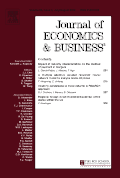
JOURNAL OF ECONOMICS AND BUSINESS
Uncovering Innovative Research in Business ManagementJOURNAL OF ECONOMICS AND BUSINESS, published by Elsevier Science Inc, stands as a leading platform for the dissemination of research in the fields of economics and business management. With an ISSN of 0148-6195, this journal is indexed in Scopus and boasts impressive rankings, including a position in the top 20% for both Finance and Economics and Econometrics. With a consistent publication history since 1978, it has become a vital resource for scholars and practitioners alike, providing insights into contemporary issues and emerging trends in the economic landscape. The journal, categorized in the Q2 quartile for both Business and Economics, invites rigorous research that advances theoretical and practical knowledge. While it operates under a subscription model, its notable impact factor reflects its significance and relevance in addressing critical questions within the business and economics domains. Whether you are a researcher, a business professional, or a student eager to deepen your understanding, the JOURNAL OF ECONOMICS AND BUSINESS is an essential resource for your academic and professional journey.
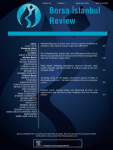
Borsa Istanbul Review
Elevating research standards in Economics and Finance.Borsa Istanbul Review, published by ELSEVIER, is a premier open-access journal making significant contributions to the field of Economics and Finance since its inception in 2013. With a commendable Q1 rating in both categories according to the 2023 metrics, this journal ranks impressively at #36 out of 317 in Finance and #91 out of 716 in Economics and Econometrics on Scopus, placing it in the top tier of international academic publications. The journal not only provides a platform for rigorous and innovative research but also aims to foster a deeper understanding of the evolving economic landscape, particularly within the frameworks of emerging markets. Catering to researchers, professionals, and students alike, Borsa Istanbul Review is dedicated to delivering high-quality, peer-reviewed scholarly articles that are freely accessible to enhance global research collaboration. It serves as an essential resource for anyone looking to stay abreast of cutting-edge developments in the financial and economic sectors.
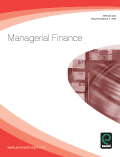
MANAGERIAL FINANCE
Bridging Theory and Practice in Financial Management.MANAGERIAL FINANCE is a prestigious academic journal published by Emerald Group Publishing Ltd, focused on the areas of finance, management, and strategy. With an ISSN of 0307-4358 and an E-ISSN of 1758-7743, this journal has carved a niche for itself within the business and financial sectors, achieving a commendable Q2 category ranking across multiple domains, including Business, Management and Accounting, Finance, and Strategy and Management, as of 2023. The journal aims to provide a platform for insightful research and critical analysis while fostering an understanding of contemporary financial practices and theories. With its wide-ranging scope, it serves as a vital resource for researchers, professionals, and students alike, looking to stay abreast of the latest trends and challenges in managerial finance. The editorial board is committed to maintaining academic rigor, ensuring that articles published are of the highest quality and relevance to the field. By bridging the gap between theory and practice, MANAGERIAL FINANCE is an essential reference for anyone involved in financial decision-making and strategic management.
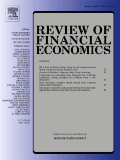
Review of Financial Economics
Catalyzing Understanding in Economics and FinanceReview of Financial Economics, published by WILEY, stands as a prominent peer-reviewed journal in the fields of economics and finance. Established in 1994, this journal provides a platform for rigorous research and thoughtful discourse, contributing to the advancement of knowledge in financial theory and its applications. With an HIndex indicative of its citation impact, it ranks in the Q3 quartile for both Economics and Econometrics, as well as Finance, based on the 2023 categorization, underscoring its role in the academic community. Although it does not currently offer Open Access, the journal remains accessible to a wide audience through institutional subscriptions. Researchers, professionals, and students are encouraged to engage with its insightful articles that address contemporary issues and advancements within financial economics, fostering a deeper understanding of the complex interplay between economic systems and financial markets.
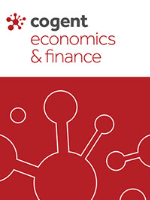
Cogent Economics & Finance
Advancing economic insights and financial strategies.Cogent Economics & Finance is a prominent open-access journal published by Taylor & Francis AS, catering to the dynamic fields of economics, econometrics, and finance. With an ISSN of 2332-2039, this journal aims to foster interdisciplinary dialogue and disseminate cutting-edge research from 2013 onwards. Hailing from the United Kingdom and featuring open access since its inception, it provides a platform for researchers, practitioners, and students to access high-quality scholarly articles without barriers. Currently categorized in the Q3 quartile for both Economics & Econometrics and Finance as of 2023, Cogent Economics & Finance remains vital for advancing knowledge in these areas, evidenced by its respectable Scopus rankings—310 out of 716 in Economics and Econometrics and 143 out of 317 in Finance. Its scope encompasses innovative research methodologies and policy implications, making it a significant resource for those on the cutting edge of economic and financial studies. Join us in exploring the critical aspects of this evolving field through our richly detailed articles, which support the academic community in addressing contemporary challenges and opportunities.
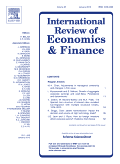
International Review of Economics & Finance
Unlocking Insights for a Global Economic Perspective.International Review of Economics & Finance is a premier academic journal published by ELSEVIER, dedicated to advancing the fields of economics and finance through high-quality, peer-reviewed research. With a distinguished history dating back to 1992 and set to continue until 2024, this journal holds an impressive Q1 ranking in both Economics and Econometrics and Finance categories as of 2023, showcasing its influential role in shaping scholarly discussions. The journal’s focus on empirical and theoretical advancements makes it an essential resource for researchers, professionals, and students seeking to understand and engage with cutting-edge economic and financial theories. Indexed in Scopus, the journal ranks in the top tiers for both finance and economics, underscoring its global impact within these disciplines. Although it does not offer open access, the journal remains committed to disseminating vital insights and fostering ongoing dialogue in the academic community.

Green Finance
Transforming financial models for a sustainable future.Green Finance, published by the American Institute of Mathematical Sciences (AIMS), is a leading Open Access journal dedicated to the intersection of financial theory and environmental sustainability. Since its inception in 2019, it has played a crucial role in advancing scholarly research in the field of green economics, providing a platform for innovative studies that address the challenges and opportunities of integrating ecological considerations into financial models. With impressive rankings, including a 97th percentile in the Economics, Econometrics, and Finance category, and a notable impact on finance and econometrics, this journal is essential for researchers, professionals, and students who aim to contribute to sustainable financial practices. Its commitment to accessibility ensures that research output is available to a global audience, fostering collaboration and knowledge exchange. Join the conversation in this vital area and explore groundbreaking research that shapes the future of financial sustainability.